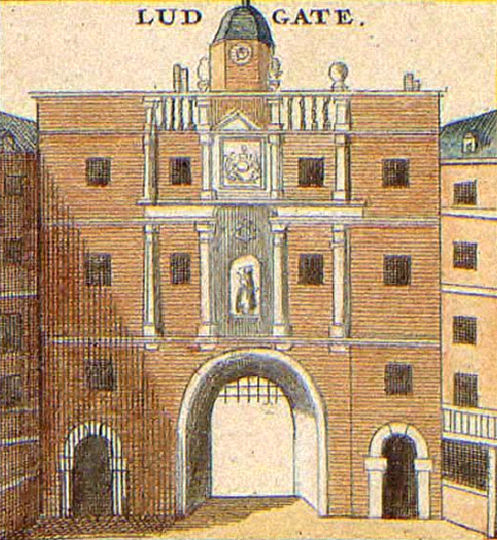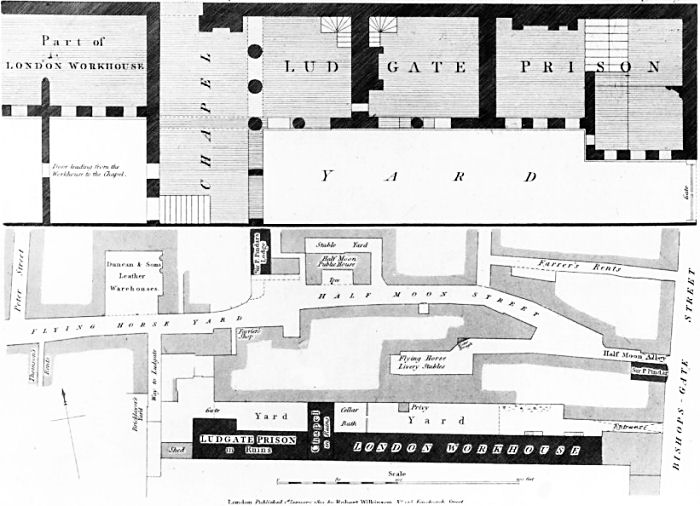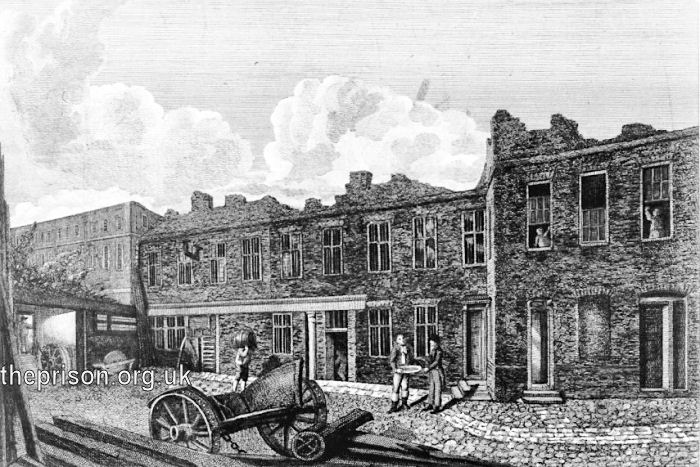Ludgate Prison, City of London
Ludgate Prison was established in 1378 in the gatehouse of London's Ludgate. It was intended as a prison for Freemen and citizens of London convicted of crimes other than felony and maiming, and for clergy who were imprisoned for minor offences.
The prison was rebuilt in 1586 and again after being destroyed in the Great Fire of London in 1666.

The Ludgate, City of London, 1670s.
The prison later relocated twice. First, in 1760, when the Ludgate was demolished, it took over part of the City of London Corporation workhouse on Bishopsgate Street and was known as the New Ludgate Prison. For a time, it acted as a bridewell for the adjoining workhouse but was subsequently appropriated for the reception of debtors who were Freemen of London, as well as clergymen, proctors, attorneys, or any others that the Court of the Lord Mayor and Aldermen thought fit to be placed there.
The Bishopsgate Street site is shown on the map below:

New Ludgate Prison site, City of London.

New Ludgate Prison, City of London.
The second removal, in 1794, was to Giltspur Street, where it was partly encircled by another prison, the Giltspur Street Compter. The Lugate's Giltspur Street premises were described by James Neild in 1812:
Ludgate has one small yard, 23 feet by 10; containing a pump, which supplies spring-water from a well in the Compter; another, affording soft water from the river Thames; and a shed, under which is a bathing tub.
The yard leads to eight rooms; viz. the Hall, fitted up with benches and tables, for the general accommodation of all the Prisoners, as a sitting-room in the day-time, and until they usually retire to rest. It is the custom of this Gaol for the Prisoners to have access to the yard at all times, either by day or night. The Hall has one fire-place, which is supplied by a Subscription from the Prisoners, of six shillings at their entrance, and seven pence weekly afterwards; aided by charitable donations, the surplus of which, after payment of certain salaries hereafter described, is divided quarterly among such Prisoners, as have been in custody for the space of one month before the same became due.
The next is a long room over the Hall, which will conveniently contain six persons, as a bed-room. The room over the long room will contain two persons, exclusive of two little rooms, partitioned from it, for the use of the sick. There is a small room over the Chapel (which is on the ground-floor;) and this, together with another room over it in the second story, are convenient bed-rooms for three persons each. Here are also two closets, which are used as bed-rooms for one person each.
Two other rooms are upon the ground-floor on the other side of the yard; one of which is the bed-room of the steward and secretary, and the other a chamber for three Prisoners. The Women's ward, over the Steward's room, will contain three persons. There are fire-places in the rooms, to which two chaldrons of coals a year are given by the Lord Mayor and Sheriffs.
All the Prisoners here find their own beds, and bedding, except one rug yearly, which the City allows to such as need it.
At Christmas every Debtor receives one pound of beef, one pint of porter, and one loaf, value three halfpence, or potatoes in lieu of it. On New Year's day, at Easter, and on some uncertain day after, the same gift is made by the Lord Mayor and Sheriffs, who also occasionally give coals, according to their discretion. Michael Angelo Taylor, Esq. M. P. on Christmas-eve gives eight pounds of beef, a halfpeck loaf, and a sack of coals, to each Prisoner; and the same to the Turnkey.
In 1815, the new Whitecross Street Prison was opened and took all the debtor inmates from Ludgate, Giltspur Street and Newgate prisons. Ludgate was then closed.
Records
Note: many repositories impose a closure period of up to 100 years for records identifying individuals. Before travelling a long distance, always check that the records you want to consult will be available.
- London Metropolitan Archives, 40 Northampton Road, London EC1R OHB. Holdings (1637-1815) include petitions, lists of prisoners, committee papers, writs, orders for payment and bills.
- The National Archives, Kew, Richmond, Surrey, TW9 4DU. Has a wide variety of crime and prison records going back to the 1770s, including calendars of prisoners, prison registers and criminal registers.
- Find My Past has digitized many of the National Archives' prison records, including prisoner-of-war records, plus a variety of local records including Manchester, York and Plymouth. More information.
- Prison-related records on
Ancestry UK
include Prison Commission Records, 1770-1951
, and local records from London, Swansea, Gloucesterhire and West Yorkshire. More information.
- The Genealogist also has a number of National Archives' prison records. More information.
Bibliography
- Higginbotham, Peter The Prison Cookbook: A History of the English Prison and its Food (2010, The History Press)
- Brodie, A. Behind Bars - The Hidden Architecture of England's Prisons (2000, English Heritage)
- Brodie, A., Croom, J. & Davies, J.O. English Prisons: An Architectural History (2002, English Heritage)
- Harding, C., Hines, B., Ireland, R., Rawlings, P. Imprisonment in England and Wales (1985, Croom Helm)
- McConville, Sean A History of English Prison Administration: Volume I 1750-1877 (1981, Routledge & Kegan Paul)
- Morris, N. and Rothman, D.G. (eds.) The Oxfod History of the Prison (1997, OUP)
- Pugh R.B. Imprisonment in Medieval England (1968, CUP)
Links
- Prison Oracle - resources those involved in present-day UK prisons.
- GOV.UK - UK Government's information on sentencing, probation and support for families.
Except where indicated, this page () © Peter Higginbotham. Contents may not be reproduced without permission.



